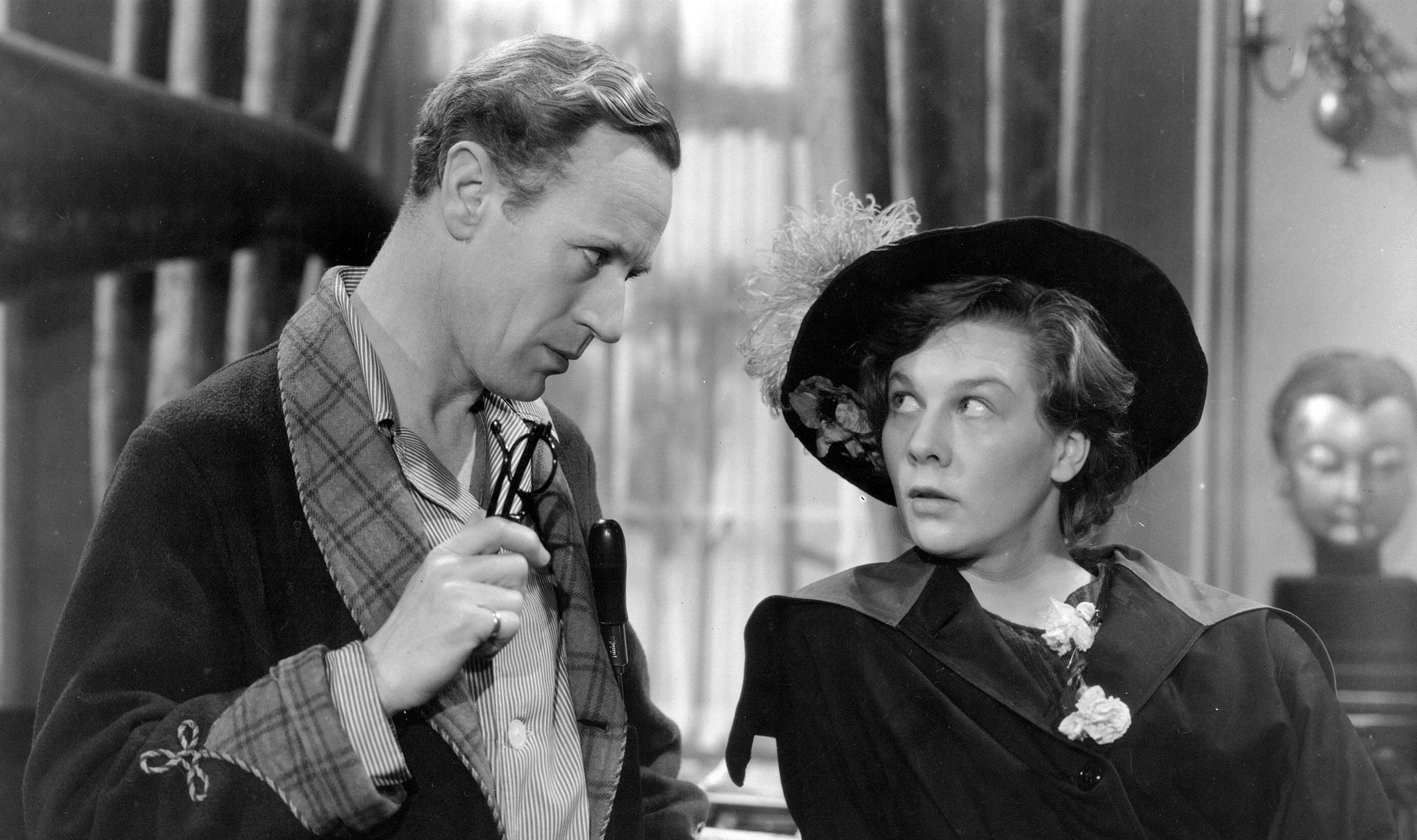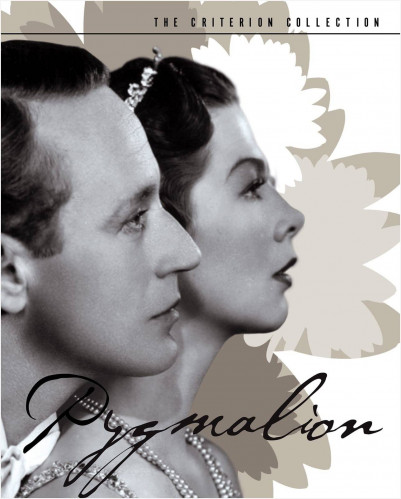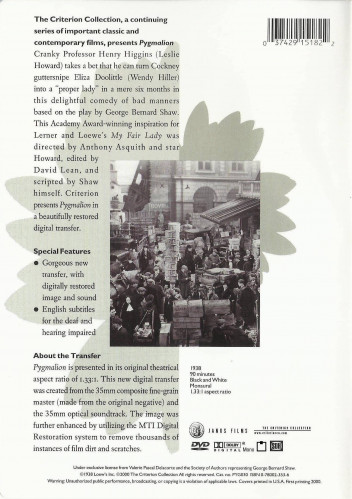PYGMALION [1938 / 2000] [The Criterion Collection] [DVD] [USA Release]
Henry Higgins wonders if a Flower Girl can really become a lady!
Cranky Professor Henry Higgins [Leslie Howard] takes a bet that he can turn Cockney guttersnipe Eliza Doolittle [Wendy Hiller] into a “proper lady” in a mere six months in this delightful comedy of bad manners, based on the play by George Bernard Shaw. This Academy Award® winning inspiration for Lerner and Loewe's ‘My Fair Lady’ was directed by Anthony Asquith and star Leslie Howard, edited by Sir David Lean, and scripted by George Bernard Shaw himself.
The Criterion Collection is dedicated to gathering the greatest films from around the world and publishing them in editions of the highest technical quality. With supplemental features that enhance the appreciation of the art of film.
FILM FACT No.1: Awards and Nominations: 1938 National Board of Review, USA: Win: Best Acting for Wendy Hiller. 1938 Venice Film Festival: Win: Volpi Cup for Best Actor for Leslie Howard. Nominated: Mussolini Cup for Best Foreign Film for Anthony Asquith and Leslie Howard. 1939 Academy Awards®: Win: Best Writing and Screenplay for George Bernard Shaw, Ian Dalrymple, Cecil Lewis and W.P. Lipscomb. Nominated: Best Picture. Nominated: Best Actor in a Leading Role for Leslie Howard. Nominated: Best Actress in a Leading Role for Wendy Hiller. 1939 New York Film Critics Circle Awards: Nominated: Best Actress for Wendy Hiller.
FILM FACT No.2: Wendy Hiller was chosen by George Bernard Shaw to play Eliza Doolittle after she had appeared in stage productions of “Pygmalion” and “Saint Joan” – though the film's initial credits stated that this movie was introducing her, she had in fact already appeared on film in 1937's Lancashire Luck. George Bernard Shaw's choice for Higgins had been Charles Laughton. The movie also includes the very first brief film appearance and was uncredited of Anthony Quayle, as an Italian wigmaker. Cathleen Nesbitt, credited here as Kathleen Nesbitt in the role of ‘A Lady,’ portrayed Mrs. Higgins in the original Broadway production of “My Fair Lady” 18 years later. The film's crew included Sir David Lean especially on his first major editing job; and also directed the montage sequence of Professor Henry Higgins teaching Eliza Doolittle, set designer Laurence Irving and the camera operator Jack Hildyard who later photographed Sir Dave Lean's ‘The Bridge on the River Kwai,’ ‘The Sound Barrier’ and ‘Hobson's Choice.’ At the 1938 Venice Film Festival, Leslie Howard won the Volpi Cup and the film was nominated for the Mussolini Cup.
Cast: Leslie Howard, Wendy Hiller, Wilfrid Lawson, Marie Lohr, Scott Sunderland, Jean Cadell, David Tree, Everley Gregg, Leueen MacGrath, Esme Percy, Violet Vanbrugh, Irene Browne, Kate Cutler, O.B. Clarence, Ivor Barnard, Cecil Trouncer, Iris Hoey, Viola Tree, Cathleen Nesbitt, Wally Patch, H.F. Maltby, George Mozart, Stephen Murray, Eileen Beldon, Frank Atkinson, Wallace Bosco (uncredited), Leo Genn (uncredited), Moyna MacGill (uncredited), Patrick Macnee (uncredited) and Anthony Quayle (uncredited)
Directors: Anthony Asquith and Leslie Howard
Producer: Gabriel Pascal
Screenplay: George Bernard Shaw (screenplay and dialogue), George Bernard Shaw (play) (uncredited), Kay Walsh (additional dialogue) (uncredited), Cecil Lewis (scenario), W.P. Lipscomb (scenario), Anatole de Grunwald (uncredited) and Ian Dalrymple (uncredited)
Composer: Arthur Honegger
Costume and Wardrobe Department: Ladislaw Czettel dress designer aka Professor L.Czettel. Madeleine Godar wardrobe (uncredited)
Cinematography: Harry Stradling Sr. (Director of Photography)
Image Resolution: 1080i (Black-and-White)
Aspect Ratio: 1.37:1
Audio: English: 1.0 Dolby Digital Mono Audio
Subtitles: English
Running Time: 95 minutes
Region: NTSC
Number of discs: 1
Studio: General Film Distributors / JANUS FILMS / The Criterion Collection
Andrew’s DVD Review: With the film ‘PYGMALION’ [1938] is a romantic drama and comedy, and Pygmalion provides sharp commentary on classism and the battle between the sexes. Pygmalion was the name of a mythological sculptor who made a statue so beautiful that he begged the gods to bring it to life. Which they did, he called it Galatea.
In London, linguistics Professor Henry Higgins [Leslie Howard] encounters poor flower girl Eliza Doolittle [Wendy Hiller] at Covent Garden. Eliza Doolittle’s coarse language and unrefined pronunciation agitate his senses. Higgins boasts to his colleague Colonel George Pickering [Scott Sunderland] that with three to six months of training he can passes Eliza Doolittle off as a duchess.
The next morning Eliza Doolittle shows up at his doorstep, reluctantly willing to undergo the transformation. Soon her father Alfred Doolittle [Wilfrid Lawson] appears, looking for a few pounds in return for giving up his daughter. With intensive effort Eliza Doolittle makes progress, and Professor Henry Higgins introduces her to his mother Mrs. Higgins [Marie Lohr] while local gentleman Freddy Eynsford Hill [David Tree] falls in love with Eliza Doolittle at first sight. The big test looms at a gala event hosted by the Ambassador of Transylvania.
An adaptation of the 1913 George Bernard Shaw play, “Pygmalion” boasts a witty, dynamic script, clashing characters, multiple attractive settings and brisk pacing. The British production is co-directed by Anthony Asquith and star Leslie Howard with an eye on revealing the superficial differences separating England's classes. The film gently mocks both upper class haughtiness and working class contentment, with only Eliza possessing the courage to test the divide.
With class differences rumbling from the first scene, where the films in-depth concerns men and women, and particularly Higgins' brand of narcissistic masculinity blocking his path towards finding love. Leslie Howard, looking younger than his 45 years of age, brings an uncompromising edge to the role of a stubbornly confirmed bachelor refusing any accommodation in his approach to life. George Bernard Shaw creates a genuinely difficult-to-like character at the middle of a would-be romance, both frustrating narrative conventions and challenging Eliza Doolittle's commitment.
Eliza Doolittle's quest becomes doubly difficult, to self- improve and seep into Professor Henry Higgins' expertly defended heart. Actress Wendy Hiller is up to the task in a touching and defiant performance, starting in the gutter and culminating with an understanding of what it really takes to thrive. Eliza Doolittle’s climactic dilemma is to decide on a future path, and the film's final act and tentative ending cannot disguise the hard work required to close the gap between two strong personalities.
Beneath the frequent sparring, the film ‘PYGMALION’ carries an admirably gentle spirit, representing Shaw's optimism about British society's essence. Colonel Pickering and Mrs. Higgins are immediately welcoming and respectful towards Eliza, and they both offer a refuge away from the caustic Higgins. Even Freddy Eynsford Hill looks well past Eliza Doolittle’s rough edges and allows love to consume him.
I understand Professor Henry Higgins is meant to be a brute and thoroughly unsympathetic, but at times Leslie Howard was to my mind wildly over-the-top in his reactions. It was as if Leslie Howard decided the film ‘PYGMALION’ was more farce than comedy. Professor Henry Higgins’s wild gestures made it hard for me to take him seriously.
Wendy Hiller on the other hand was thoroughly delightful as Eliza Doolittle, this squashed cabbage leaf turned elegant lady. Her transformation is a mix of innocent, even naiveté and quiet strength. Wendy Hiller as Eliza Doolittle plays comedy quite well, such as at the tea party where she elegantly replies to Freddy Eynsford Hill's request to take a walk in the park with “A walk? Not bloody likely. I'm going in a taxi.” It is both Eliza Doolittle's thorough lack of understanding about what she said and how she said it that sells the comedy.
When it comes to the more dramatic moments, Wendy Hiller is equally adept, and Eliza Doolittle does not even need George Bernard Shaw's brilliant verbiage to play it. When Eliza Doolittle goes back to Covent Garden as the more refined version of herself, and Eliza Doolittle observes that world in which Eliza Doolittle no longer has any emotional attachment to the place. It's a beautifully played moment.
The other performers were quite good. David Tree was appropriately sappy and insipid as Freddy Eynsford Hill, forever besotted by the enchanting Eliza Doolittle. Scott Sunderland's Colonel Pickering was proper and polite, and Marie Lohr as Mrs. Higgins played things in a quietly exasperated manner. Surprisingly, while Wilfrid Lawson's Alfred Doolittle had decent moments he was only in two scenes and could easily have been cut from the film, as could Leueen MacGrath as Clara Eynsford Hill, Freddy Eynsford Hill’s sister.
The pacing is also helped by the series of montages for both the elocution and etiquette lessons. These were done by Sir David Lean, who would become one of the Great Directors himself.
George Bernard Shaw co-wrote the Academy Award® winning script, which was subsequently the basis for the 1956 musical play “My Fair Lady” and the lavish 1964 film Hollywood treatment. The 1938 version may lack the celebratory musical panache, but the astute words speak for themselves.
Leslie Howard directed this movie surprisingly well. Again, the direction here is nothing amazing, but it’s pretty solid, which goes to show how multitalented he was. His performance is also excellent in the important role of Henry Higgins. As for actress Wendy Hiller, I hadn’t been quite familiar with her before this film, but now I would like to see more of her and people should check out the marvellous DVD ‘Making Love’ as Wendy Hiller is the main superb attraction in that wonderful film.
It’s all here in this film version from 1938, an adaptation of George Bernard Shaw’s 1913 play about a phonetics professor called Professor Henry Higgins teaching a Cockney flower seller called Eliza Doolittle how to pass her off as a lady – for a bet. The name Henry Higgins, of course, is a George Bernard Shaw’s joke . . . and a test. Professor Henry Higgins is “Enry Iggins” until Eliza Doolittle makes the grade. Yes, Wendy Hiller is terrific here – and as believable in her role as Eliza Doolittle, so charming and just perfectly cast.
But in the background is Sir David Lean, working as Anthony Asquith’s editor in his first important job. Anthony Asquith gave Sir David Lean the central montage sequence to direct – of the professor painstakingly making “a duchess of this draggle-tailed guttersnipe” – which shows Anthony Asquith’s confidence in Sir David Lean’s abilities.
George Bernard Shaw was an Irishman and his play examines and gently satirises the codes of the British class system. In doing so George Bernard Shaw poses himself a question as the film progresses. If there really is no barrier to entry and learning to speak “properly” is enough to get you in, doesn’t that invalidate his objections? If you want admission, pay the entry fee! Putting the words in Eliza Doolittle’s mouth, and George Bernard Shaw has a very neat answer to that. You don’t win an Oscar® and a Nobel Prize for being stupid.
Although the film ‘PYGMALION’ has it’s slower and less interesting stretches, most of it is very engaging to follow. In particular, the first half is stellar stuff. I found it very charming, just goofy enough and with a great sense of humour. Its light, comedic approach worked wonders to make it pleasant and enjoyable to watch.
‘PYGMALION’ is opaque on the future of Eliza Doolittle and Henry. The ending works despite George Bernard Shaw's dislike for it because it is ambiguous. It suggests a happy ending but it does not openly declare one. There is a wealth of possibilities that allow for us to think what we will.
Will they find love with each other? Will they part and if they do will it be as friends or rivals? Will we ever really learn what actually happens in the end to our fair lady? Not bloody likely!
* * * * *
DVD Image Quality – General Film Distributors, JANUS FILMS and The Criterion Collection presents us the film ‘PYGMALION’ with 1080i Black-and-White and shown in the 1.37:1 aspect ratio. Unfortunately, The Criterion Collection has given us probably one of the most unspectacular editions to ever come from the company. The first hour of the film is interlaced with varied types of image quality. But then, during the last half hour or so, the transfer goes progressive and while this does improve the image it’s still not a treat and you do get to view some shimmering effects. The film can look mushy now and again and really lacks any sharpness and detail, and grey levels are flat, with weak black levels. All in all it looks very bland. Although it is not quite a good transfer, but it did not stop me enjoy a wonderful film. Unfortunately it doesn’t look like much has been done in the way of restoration and the print is still laced with marks, stains, hairs, scratches, burns, and all sorts of other issues, which are constantly popping up. Hopefully The Criterion Collection might make an effort to release an upgraded Blu-ray disc release sometime in the far off distant future.
DVD Audio Quality – General Film Distributors, JANUS and The Criterion Collection brings us the film ‘PYGMALION’ with a 1.0 Dolby Digital Mono Audio experience and is open to improvement but it could be much worse, taken that as faint praise. Though it’s edgy and slightly hollow, and the dialogue is still easy to understand and the composed music has some decent range. There is some background noise, pops, and scratches, but it doesn’t overly harm the audio presentation.
* * * * *
DVD Special Features and Extras: Not even one single special feature supplement is included with this DVD edition.
BONUS: New cover design by Michael Boland and is a US art director and graphic designer who founded The Boland Design Company in 1990.
PLUS: A wonderful insert featuring an in-depth essay by David Ehrenstein. David Ehrenstein has been writing about film since 1965, for such publications as Film Culture, Film Quarterly, Film Comment, Cahiers du cinéma, and Positif. David Ehrenstein books include The Scorsese Picture: The Art and Life of Martin Scorsese and Open Secret: Gay Hollywood 1928 – 2000.
Finally, the 1938 film ‘PYGMALION’ adaptation has its weaker parts in the film, especially the inferior third act, but most of the film is phenomenally adapted thanks to a stellar script. The movie is surprisingly cinematic, engaging and charming. The performances from both Leslie Howard and Wendy Hiller are both very believable and totally terrific. Highly Recommended!
Andrew C. Miller – Your Ultimate No.1 Film Aficionado
Le Cinema Paradiso
United Kingdom



